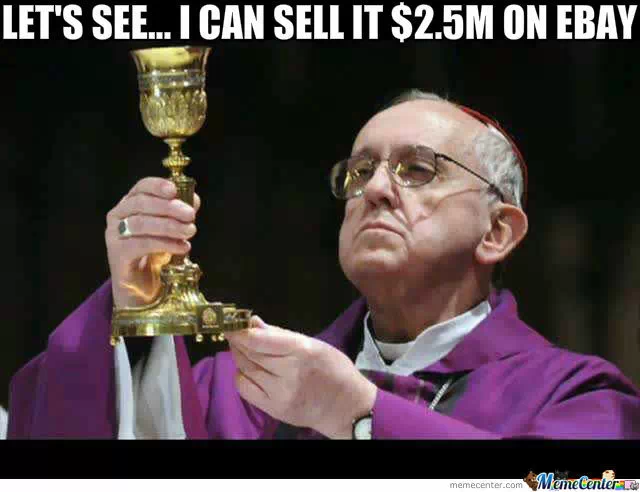Firstly, it was an excellent reminder as to why I no longer read the paper; anymore, it's all bad news written by bad people. Secondly, though, it reminded me of a phenomenon I encounter at least once a month (usually in the church I work at). Someone (Catholic or not, this is an equal-opportunity encounter) will express that they firmly believe that Pope Francis is some sort of reformer, cutting through 2000 years of Tradition and “modernizing” or “liberalizing” the Church. Sometimes, they are happy about this belief and sometimes they aren't so happy.
The source of this belief is not hard to determine. Since the first moments the white smoke issued from the Sistine Chapel, the media in America have been preaching the good news of the new Pope, the first American Pope, the first Jesuit Pope, the first Pope to fall into a number of categories... clearly, this will be the first Pope to allow gay, married women priests and sell the Vatican in order to be the first Pope to carry out Christs message of charity, and oh-my-god isn't he so cool and rebellious, it's no wonder these enlightened liberal millenials in America love him. Of course, this depiction sounds like facetious mockery... but it is only barely an exaggeration. I hear someone parrot these talking points from the Huffington Post at least once a month.
The amusing part of this hubhub is that this is merely the latest sequel in one of the media's most boring franchises. I have heard and read firsthand accounts of life before, during, and after the Second Vatican Council (1962-1965). Despite what so many people seem to think, Vatican II was actually a very minor event, both in the Church and its relationship to the world. Whereas previous Ecumenical Councils resulted in such incredible things as canonizing the Scriptures, building the fundamental doctrines of the Faith, and structurally overhauling the magisterium of the Church, Vatican II resulted in a mere decision to allow adoption of the vernacular, integrating modern technologies into mundane church features such as architecture, and better defining and encouraging lay involvement in Church faculties.
Western society, composed primarily of under-educated, lukewarm Christians and secularists, however, were ecstatic with the results of Vatican II. The media produced a narrative throughout this event that was comically divergent from what actually occurred. Even a very brief comparison of of Lumen Gentium and the newspaper clippings reveal a tale of two Councils. However, because Catholics in the western world received their news and education from the mainstream media, they seemed to think that Vatican II was an endorsement of tambourine-waving belly-dancers wielding snakes and doing bodyshots with the Blood of Christ (way to go, Germany). Even priests and bishops found themselves falling for the state fairy tales rather than simply reading a book issued by the Vatican.
Today is no different. As Francis uttered his first papal words, he could barely be heard over the media ecstatically shouting, “Women Priests! Gay Marriage! Married Priests! Pedophile Witch Hunt!” This, of course, made the more Catholic members of the church very skeptical towards the Pope. I, with my apocalyptic personality, was one of these people. Making a conscious effort to maintain stoic silence and apatheia; I managed to have no comment on Francis until he began speaking, writing, and generally pope-ing. Listening to what he says, reading what he writes, and hearing from friends in the Vatican, I quickly realized that Francis truly is a Pope, like any other.
He preaches the message of Christ, in the same words and the same philosophy as Benedict XVI and John Paul the Great before him. Evangelii Gaudium reads similarly to “Love and Responsibility”, Deus Caritas Est, and “Humanae Vitae” (not from Benedict or JPII, but still important) and, rather than undermining or overthrowing them, simply affirms what they have already stated. There exists two popes today as there exist two Vatican IIs: there is the liberal Jesus who is trying to reform a stale old Church, protestant-style, to change every area of doctrine to match the clearly superior opinions of millenials in the western world, and there is a Catholic pope who preaches love, responsibility, and the infallible and unchanging doctrines of the Church.
This particular article finally inspired me to write about this phenomenon for one particular reason (besides giving my friend a shout-out); There was a clever and vague attempt hidden in the article to undermine the doctrine of infallibility. The article frames infallibility in the context of politics and personal interests as opposed to the realm of philosophy and faith. There does exist certain philosophical issues concerning infallibility, but politics is not one of them. The most central of these issues is the one alluded to in the article and has ties to the philosophy of science. What does infallibility mean and how can one prove it?
Taking the philosophical route, I will attempt to categorically define infallibility. Infallibility is a state of epistemic affairs in which one's knowledge claims necessarily comport to reality. In the case of the doctrine of infallibility, this state of affairs is limited to the pope's definitions of doctrine with regards to faith or ethics to be applied universally. As for what infallibility looks like, we are presented a certain epistemic issue alluded to in the article. Infallibility, as indicated in the First Vatican Council (1869-1870), would be fairly easy to identify... at least, to a believer. Every utterance of the pope that is supposed to be infallible, if logically consistent with all other infallible claims and not clearly a violation of natural law would be identifiable as infallible. Of course, until such a time that a supposedly infallible claim violates existing infallible claims, this instance of infallibility would be indistinguishable from a tradition of very, very careful and academic politicking. In philosophy, it is often referred to as the inductive problem of grue and bleen (http://en.wikipedia.org/wiki/New_riddle_of_induction). As a popperian, I claim we can assume that the doctrine of infallibility obtains and blue is blue until such a time that the claim is falsified... so long as we are aware of and open to the possibility that it is simply careful politicking and blue is actually bleen.
How do these two ideas come together and how can I tie this to my anarchist principles? Media pope vs. the Pope's words and actions and the doctrine of infallibility meets anarchy. This is my chance to give a peek behind the curtain of my private life and show that I am not just some naive cradle Catholic that imagines the Church to be some inviolate mother who never misbehaves; I readily admit to a great many faults of the people withing the magisterium. The way the western world responded to Vatican II and Pope Francis and outright denies the the teachings contained in Church documents like “Humanae Vitae” is almost entirely the fault of bishops and priests (and to a lesser degree the lay ministers) in the church. The Church has abdicated a great many of it's duties and functions to the state, one of which is exemplified here; Catholics, “good” and “bad”, learn what it means to be Catholic and what the Church teaches from the state and media instead of from the pulpit and parish. I have a lot to say about separation of church and state and how an anarchist could be Catholic (hint: one is a prerequisite for the other), but as pertains to the tale of two popes, this is all I have time for today.
TL;DR: If you think Pope Francis is any different from our last two popes, you need to read what they say, write, and do, instead of listening to MSNBC and Fox (just turn that shit off). Either the doctrine of infallibility obtains or we have a 2000 year old tradition of a most impressive degree of diligence. The confusion concerning the Church and “politics” within the Church is the Church's fault, as it has allowed its flock to become statists at the expense of being Catholic. And lastly, you ought to listen to this podcast on the Synod on the Family: http://catholicstuffpodcast.com/?p=906



 RSS Feed
RSS Feed
